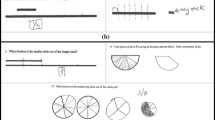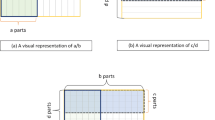Abstract
The purpose of this study was to investigate prospective mathematics teachers’ knowledge of common conceptions and misconceptions that sixth and seventh grade students had about multiplication of fractions. In addition, prospective teachers’ knowledge of the sources of these misconceptions and strategies they knew to overcome these misconceptions was examined. Data were collected from 17 Turkish prospective teachers at the end of the spring semester of the 2004–2005 academic year. A case study design was used in which data were collected through the Multiplication of Fractions Questionnaire and semi-structured interviews. The prospective teachers suggested many difficulties that elementary grade level students may have and stated that these difficulties stemmed from students’ lack of formal knowledge and rote memorization of the algorithms. In addition, the prospective teachers suggested many strategies that could be used to overcome these misconceptions or difficulties. These strategies could be grouped under three headings: strategies based on teaching methods, strategies based on formal knowledge of fractions, and strategies based on psychological constructs.
Similar content being viewed by others
References
An, S., Kulm, G., & Wu, Z. (2004). The pedagogical content knowledge of middle school, mathematics teachers in China and the US. Journal of Mathematics Teacher Education, 7(2), 145–172.
Ashlock, R. D. (1990). Error patterns in computation. New York: Macmillan.
Azim, D. S. (1995). Preservice elementary teachers’ understanding of multiplication with fractions. Unpublished doctoral dissertation, Washington State University.
Ball, D. L. (1990). Prospective elementary and secondary teachers’ understanding of division. Journal for Research in Mathematics Education, 21, 132–144.
Ball, D. L., & Bass, H. (2003). Toward a practice-based theory of mathematical knowledge for teaching. In B. Davis & E. Simmt (Eds.), Proceedings of the 2002 annual meeting of the Canadian mathematics education study group (pp. 3–14). Edmonton, AB: CMESG/GCEDM.
Ball, D. L., Lubienski, S. T., & Mewborn, D. S. (2001). Research on teaching mathematics: The unsolved problem of teachers’ mathematical knowledge. In V. Richardson (Ed.), Handbook of research on teaching (pp. 433–456). New York: Macmillan.
Ball, D. L., & McDiarmid, G. W. (1990). The subject-matter preparation of teachers. In W. R. Houston (Ed.), Handbook of research on teacher education: A project of the Association of Teachers (pp. 437–449). New York: MacMillan.
Behr, M. J., Harel, G., Post, T., & Lesh, R. (1992). Rational number, ratio, and proportion. In D. A. Grouws (Ed.), Handbook of research on mathematics teaching and learning (pp. 296–333). New York: Macmillan.
Behr, M. J., Lesh, R., Post, T., & Silver, E. A. (1983). Rational number concepts. In R. Lesh & M. Landau (Eds.), Acquisition of mathematics concepts and processes (pp. 91–126). New York: Academic Press.
Borko, H., Eisenhart, M., Brown, C. A., Underhill, R. G., Jones, D., & Agard, P. C. (1992). Learning to teach hard mathematics: Do novice teachers and their instructors give up too easily? Journal for Research in Mathematics Education, 23, 194–222.
Borko, H., & Putnam, R. T. (1996). Learning to teach. In D. C. Berliner & R. C. Calfee (Eds.), Handbook of educational psychology (pp. 673–708). New York: Macmillan Library Reference USA.
Crespo, S., & Nicol, C. (2006). Challenging pre-service teachers’ mathematical understanding: The case of division by zero. School Science and Mathematics, 106(2), 84–97.
Davis, B., & Simmt, E. (2006). Mathematics-for-teaching: An ongoing investigation of the mathematics that teachers (need to) know. Educational Studies in Mathematics, 61, 293–319.
Fischbein, E., Deri, M., Nello, M., & Marino, M. (1985). The role of implicit models in solving verbal problems in multiplication and division. Journal for Research in Mathematics Education, 16, 3–17.
Graeber, A. O. (1999). Forms of knowing mathematics: What preservice teachers should learn. Educational Studies in Mathematics, 38, 189–208.
Graeber, A. O., & Tirosh, D. (1988). Multiplication and division involving decimals: Preservice teachers’ performance and beliefs. Journal of Mathematical Behavior, 7, 263–280.
Greer, B. (1992). Multiplication and division as models of situation. In D. A. Grouws (Ed.), Handbook of research on mathematics teaching and learning (pp. 276–295). New York: Macmillan.
Greer, B. (1994). Extending the meaning of multiplication and division. In G. Harel & J. Confrey (Eds.), The development of multiplicative reasoning in the learning of mathematics (pp. 61–85). Albany, NY: SUNY Press.
Hill, H. C., Rowan, B., & Ball, D. L. (2005). Effects of teachers’ mathematical knowledge for teaching on student achievement. American Educational Research Journal, 42, 371–406.
Hill, H. C., Schilling, S. G., & Ball, D. L. (2004). Developing measures of teachers’ mathematics knowledge for teaching. The Elementary School Journal, 105(1), 11–30.
Howey, K. R., & Grossman, P. L. (1989). A study in contrast: Sources of pedagogical content knowledge for secondary English. Journal of Teacher Education, 40, 24–31.
Izsák, A. (2008). Mathematical knowledge for teaching fraction multiplication. Cognition and Instruction, 26, 95–143.
Ma, L. (1999). Knowing and teaching elementary mathematics: Teachers’ understanding of fundamental mathematics in China and the United States. Mahwah, NJ: Lawrence Erlbaum Associates.
Mack, N. K. (1990). Learning fractions with understanding: Building on informal knowledge. Journal for Research in Mathematics Education, 21(1), 16–32.
McDiarmid, G. W., & Wilson, S. M. (1991). An exploration of the subject matter knowledge of alternate route teachers: Can we assume they know their subject? Journal of Teacher Education, 42, 93–103.
National Council of Teachers of Mathematics. (2000). Principles and standards for school mathematics. Reston, VA: Author.
Post, T. R., Harel, G., Behr, M. J., & Lesh, R. (1991). Intermediate teachers’ knowledge of rational number concepts. In E. Fennema, T. P. Carpenter, & S. J. Lamon (Eds.), Integrating research on teaching and learning mathematics (pp. 177–198). Albany, NY: State University Press of New York.
Prediger, S. (2008). The relevance of didactic categories for analyzing obstacles in conceptual change: Revisiting the case of multiplication of fractions. Learning and Instruction, 18, 3–17.
Schifter, D. (1998). Learning mathematics for teaching: From a teachers’ seminar to the classroom. Journal of Mathematics Teacher Education, 1, 55–87.
Shulman, L. S. (1986). Those who understand: Knowledge growth in teaching. Educational Researcher, 15(2), 4–14.
Shulman, L. S. (1987). Knowledge and teaching: Foundations of the new reform. Harvard Educational Review, 57(1), 1–22.
Simon, M. (1993). Prospective elementary teachers’ knowledge of division. Journal for Research in Mathematics Education, 24, 233–254.
Simon, M. A., & Blume, G. W. (1994). Building and understanding multiplicative relationship: A study of prospective elementary teachers. Journal for Research in Mathematics Education, 25(5), 472–494.
Stafylidou, S., & Vosniadou, S. (2004). The development of students’ understanding of the numerical value of fractions. Learning and Instruction, 14, 503–518.
Tirosh, D. (2000). Enhancing prospective teacher’ knowledge of children’s conceptions: The case of division of fractions. Journal for Research in Mathematics Education, 31(1), 5–25.
Tirosh, D., & Graeber, A. O. (1991). The effect of problem type and common misconceptions on preservice elementary teachers’ thinking about division. School Science and Mathematics, 91, 157–163.
Van de Walle, J. A. (2005). Elementary and middle school mathematics: Teaching developmentally. Boston, MA: Allyn and Bacon.
Acknowledgments
We are grateful to the anonymous reviewers for their insightful comments and suggestions on an earlier version of this article.
Author information
Authors and Affiliations
Corresponding author
Appendices
Appendix A: the multiplication of fractions questionnaire (MFQ)
-
1.
Mert has 7 chocolate bars. He decided to give one-third of these chocolates to his close friend Emre. How many chocolates will Emre get?
-
a.
Write a mathematical expression for the problem
-
b.
Find the answer to the problem
-
c.
List two common mistakes students in sixth or seventh grade may make while performing (a) and/or (b)
-
d.
Describe possible sources for each of these mistakes depending on students’ thinking
-
e.
How will you overcome these difficulties?
-
a.
-
2.
Elif bought a bottle of milk. She gave \( \frac{1}{2} \) of it, which was \( 1\frac{3}{4} \) lt to her grandmother. How much did the bottle of milk originally contain?
-
a.
Write a mathematical expression for the problem
-
b.
Find the answer to the problem
-
c.
List two common mistakes students in sixth or seventh grade may make while performing (a) and/or (b)
-
d.
Describe possible sources for each of these mistakes depending on students’ thinking
-
e.
How will you overcome these difficulties?
-
a.
-
3.
Consider the following multiplication of fraction problems and answer the following questions for each of them.
a. \( \frac{2}{3} \times \frac{3}{5} \) b. \( 1\frac{1}{2} \times \frac{1}{3} \),
-
1.
List two common mistakes students in sixth or seventh grade may make while performing the operations
-
2.
Describe possible sources for each of these mistakes depending on students’ thinking
-
3.
How will you overcome these difficulties?
Appendix B: sample items from the semi-structured interview protocol
The researchers ask the following questions based on the answers given in the MFQ.
-
In general, the phrases that are used during the interview include:
-
“What do you mean by…..”
-
“Here you mentioned that ….’
-
“Tell me more on……” (if there is something that is not clear to the researcher on the questionnaire)
-
“Why do you think so…..” (if there is something that is not clear to the researcher on the questionnaire)
Rights and permissions
About this article
Cite this article
Isiksal, M., Cakiroglu, E. The nature of prospective mathematics teachers’ pedagogical content knowledge: the case of multiplication of fractions. J Math Teacher Educ 14, 213–230 (2011). https://doi.org/10.1007/s10857-010-9160-x
Published:
Issue Date:
DOI: https://doi.org/10.1007/s10857-010-9160-x




